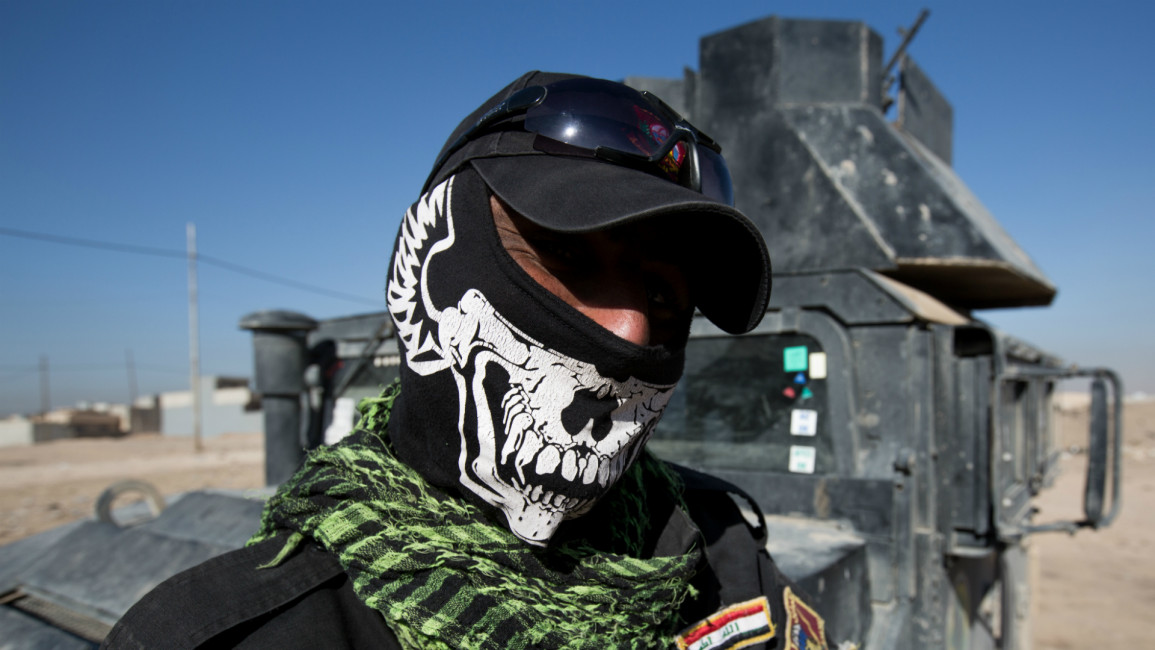
From 'dirty' to 'golden': The death-masked brigade routing IS
Iraq’s military announced on Thursday that it had taken 'full control' of the eastern side of Mosul three months after operations targeting the Islamic State-held city began.
As IS fighters struggle to maintain their hold on the city, increasingly pushed back into defensive positions in an ever-shrinking territory, the extremist group has been confronted by gunmen clad in skull-like masks seeking to rout them from Mosul.
The Iraqi army’s elite, US-trained Golden Division is made up of around 10,000 members from different ethnic, and religious/sectarian backgrounds and has been described by US officials as the “lead sled dog” in current assaults on Mosul.
Members of the unit, whose training is analogous to that of US Army Rangers, have developed a proclivity for donning skull faced-masks, skull balaclavas, and skull insignias with their all-black fatigues as they battle IS on the frontlines.
Officially titled the 1st Commando Battalion of the 1st Special Operations Brigade of the Iraqi army, before current Mosul operations began, the Golden Division was viewed with trepidation by some members of the Iraqi population, and stood accused of running secret prisons, and conducting extra-judicial killings in the country.
The elite army unit, founded in the aftermath of the 2003 US-led invasion, was even nicknamed the “Dirty Division”.
Suspicion of the group in part stemmed from the fact that it was formed under the command of Nouri al-Maliki, rather than either the Defence or Interior Ministry and was correspondingly seen as doing the former prime minister’s bidding in eliminating and subduing potential rivals.
However, the emergence of IS in Iraq, and the role played by the Golden Division at the forefront of efforts to reverse advances made by the extremist group, have led to an upsurge in the group’s popularity.
| Facebook Post |
The elite unit’s separation from the Iraqi army’s traditional security structure, previously a cause of suspicion, has also buffered the Golden Division from accusations of corruption levelled at Iraq’s mainstream military, whose divisions positioned in Mosul notably imploded, and retreated in the face of IS advances in Iraq in 2014, leaving millions of dollars’ worth of American military hardware to the extremist group in the process.
Emblematic of a massive, positive PR reversal, the Golden Division has risen to celebrity status as a result of its campaigns against IS, with its Facebook page now subscribed to by over two million people.
However, both victories on the ground and in the realm of public relations have come at a cost.
Speaking in December, one US military official with access to daily battle reports from the area, said that due to high death tolls “the division could become combat ineffective in a little over a month, and perhaps even sooner.”
While Golden Briade commanders have admitted heavy casualties they have also pointed out that new recruits are being trained and vowed to continue to lead the fight until the city is liberated.
However, given deep divisions and fractures in Iraqi society – brushed under the rug in order to combat the threat of the common enemy in IS – retaining its “golden” reputation once Mosul falls is likely to prove an uphill struggle for the skull-mask-clad elite unit, similar to that faced by Iraqi lawmakers seeking to establish unity across Iraq once the extremist group has been routed from its main base in the country.
| Facebook Post |




